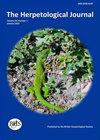The importance of long-term genetic monitoring of reintroduced populations: inbreeding in the natterjack toad (Epidalea calamita)
IF 1.1
4区 生物学
Q3 ZOOLOGY
引用次数: 2
Abstract
Genetic monitoring is an important, but frequently lacking, component of management actions to support long-term persistence in reintroduced populations. Populations that remain small, due to demographic processes and genetic diversity, are more likely to experience a second extinction event. The natterjack toad (Epidelea calamita) is legally protected in Britain and was the subject of a reintroduction programme in the 1990s. However, subsequent genetic assessment has been mostly lacking. The aim of this study was to assess the genetic diversity of two reintroduced populations of natterjack toads in order to inform conservation management. Adults were sampled and nine microsatellites amplified to assess neutral genetic variation within each site and for comparison with the source population. Inbreeding was observed at the reintroduction sites, as evidenced by high FIS values (0.43 and 0.72), low observed compared to expected heterozygosities, and significant deviation from Hardy-Weinberg equilibrium. Observed heterozygosity is currently lower in the reintroduction sites than it was in the source population at the time of the reintroductions (Red Rocks: 0.15±0.20; Talacre: 0.12±0.20; Ainsdale (source): 0.29). Evidence for a bottleneck was not found, although this is likely a result of sampling overlapping generations. No withinsite population structuring was observed. Such low genetic diversity has not previously been recorded in any natterjack population. Genetic rescue, combined with pool creation, is the most viable option for safeguarding the species at these sites into the future. Our work highlights the importance of ongoing genetic monitoring, in collaboration with conservation organisations, to support conservation management.对重新引入种群进行长期基因监测的重要性:纳豆蟾蜍(Epidalea calita)的近亲繁殖
遗传监测是支持重新引入种群长期生存的管理行动的重要组成部分,但往往缺乏这一组成部分。由于人口统计过程和遗传多样性,保持较小的种群更有可能经历第二次灭绝事件。黄鼬蟾蜍(Epidelea calamita)在英国受到法律保护,并在20世纪90年代进行了重新引入计划。然而,随后的遗传评估大多缺乏。本研究的目的是评估两个重新引入的黄衣蟾蜍种群的遗传多样性,以便为保护管理提供信息。对成人进行取样,扩增9颗微卫星,以评估每个站点内的中性遗传变异,并与源种群进行比较。在放归点观察到近交现象,FIS值较高(0.43和0.72),杂合度较低,偏离Hardy-Weinberg平衡。目前观察到的杂合度在重新引入地点低于重新引入时源种群的杂合度(红岩:0.15±0.20;Talacre: 0.12±0.20;Ainsdale(来源):0.29)。没有发现瓶颈的证据,尽管这可能是采样重叠代的结果。未观察到种群结构。如此低的遗传多样性以前从未在任何天鼠种群中记录过。基因拯救,结合池的创建,是未来保护这些地方物种的最可行的选择。我们的工作强调了与保护组织合作进行遗传监测的重要性,以支持保护管理。
本文章由计算机程序翻译,如有差异,请以英文原文为准。
求助全文
约1分钟内获得全文
求助全文
来源期刊

Herpetological Journal
生物-动物学
CiteScore
2.40
自引率
10.00%
发文量
25
审稿时长
>12 weeks
期刊介绍:
The Herpetological Journal is the Society''s prestigious quarterly scientific journal.
 求助内容:
求助内容: 应助结果提醒方式:
应助结果提醒方式:


